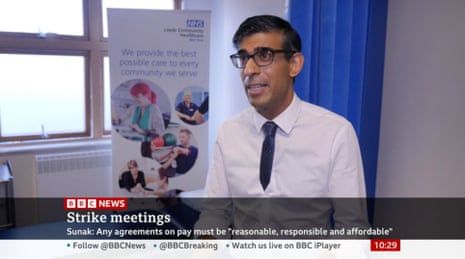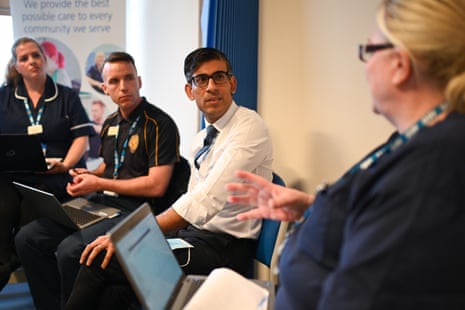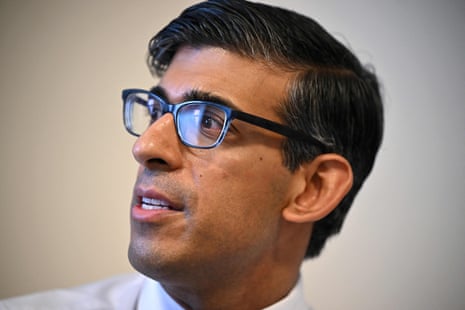Sunak does not deny reports No 10 considering one-off payment to end nurses strike
BBC News is broadcasting an interview with Rishi Sunak.
Asked if the government is proposing a one-off payment to nurses, Sunak does not deny that. “You would not expect me to comment on specifics,” he says.
He says the government wants to be reasonable. It is important to keep talking.
Q: What did you mean yesterday when you said the pay talks would cover pay for this year? (It was not clear if Sunak was talking about pay settlement for the 2023-24 financial year, or the 2022-23 financial year.)
Sunak sidesteps the question.
It was my colleague Pippa Crerar who reported overnight that the government was considering a one-off payment for nurses as a means of ending the strike.
I will post more from the Sunak interview shortly.

Key events
Filters BETA

Sunak sums up his asylum promise as being to ‘stop the boats’
Rishi Sunak also insisted in his pooled TV interview that the government was focused on “the people’s priorities”. Referring to the promises he announced last week, he
What the government is getting on with is delivering on the people’s priorities. I set out five priorities, five promises I wanted to make to the country – that’s to halve inflation, grow the economy, reduce debt, reduce waiting lists, and stop the boats. That’s squarely what everyone in government is focused on.
Sunak also used this shorthand account of his promises on Twitter last week, and in his ConservativeHome article, and that means that is now the settled summary of what he is pledging. It is significant because a promise to legislate with the intention of stopping small boat Channel crossings has become a commitment to “stop the boats”.
While experts believe Sunak can achieve the first four quite easily, very few commentators believe he will “stop the boats”.
(Perhaps he is assuming that the public will view the tests as a GSCE exam, and that four out of five will qualify as a good pass.)
Sunak refuses to say whether he thinks today’s talks could led to next week’s nurses’ strike being averted
In his pooled broadcast interview Rishi Sunak was asked if he accepted that the talks happening today would not be able to avert the nurses’ strike scheduled for next week. He sidestepped the question, and just said that it was good that the talks were happening.
Earlier Patricia Marquis, director for England at the Royal College of Nursing, said that even though the talks were taking place, it was “unlikely” that they would result in the strike would be called off. (See 10.19am.)
This is what Rishi Sunak said in his pooled broadcast interview this morning when asked about reports the government was considering a one-off payment to nurses. Asked if one-off payments could be offered to workers in other sectors too, he replied:
We’ve always said the government is happy to talk about pay demands, pay issues, that are anchored in what’s reasonable, what’s responsible, what’s affordable for the country, but the most important thing is those talks are happening. Let’s try and sit down and find a way through.
Asked again to confirm that a one-off payment was on the table, he replied:
You wouldn’t you would expect me to comment on specifics, but the most important thing is that the conversations are happening … with regard to pay.
Asked to clarify whether ministers would talk about the current, 2022-23 pay offer in the talks with unions today (which is what the unions want), or whether the talks would just cover the settlement for the next financial year (originally the government’s intention – it has said it will not reopen the current pay offer), Sunak dodged the question. He just said that people could be reassured that dialogue was happening, and he repeated his point about the need for a pay settlement to be affordable. He added:
The talks are happening, that’s a good, positive sign, and the most important thing is we let those talks carry on.

Sunak does not deny reports No 10 considering one-off payment to end nurses strike
BBC News is broadcasting an interview with Rishi Sunak.
Asked if the government is proposing a one-off payment to nurses, Sunak does not deny that. “You would not expect me to comment on specifics,” he says.
He says the government wants to be reasonable. It is important to keep talking.
Q: What did you mean yesterday when you said the pay talks would cover pay for this year? (It was not clear if Sunak was talking about pay settlement for the 2023-24 financial year, or the 2022-23 financial year.)
Sunak sidesteps the question.
It was my colleague Pippa Crerar who reported overnight that the government was considering a one-off payment for nurses as a means of ending the strike.
I will post more from the Sunak interview shortly.

Linking future pay rises to NHS efficiency reforms shows ‘misunderstanding’ of state of NHS, says RCN
In her Sky News interview Patricia Marquis, director for England at the Royal College of Nursing (RCN), said she was alarmed by suggestions from government that future pay increases for nurses could be linked to efficiency reforms. She said that made her “very, very worried”. She explained:
It shows a level of misunderstanding of the situation the NHS and nursing is in at the moment.
There aren’t enough staff to deliver the care that needs to be delivered and there isn’t enough funding in the NHS.
Of course, there’s always some sort of efficiencies that can be made but it really does sound like what they’re trying to do is get … the NHS to fund its own pay award and we don’t think that’s possible. We really think this needs to be extra money that is clearly earmarked for for nursing pay.
RCN official says it is ‘unlikely’ today’s talks will lead to strike later this month being called off
Patricia Marquis, director for England at the Royal College of Nursing (RCN), told Sky News this morning that she thought it was “unlikely” that the talks with the government taking place today would lead to the planned nurses’s strike for later this month being called off.
Asked about the chances of the strike being called off, she told Sky News:
At the moment, it feels unlikely but we’ll see what today brings in those conversations with Steve Barclay.
If there are chinks of hope, if there are further meetings, then I and my colleagues will all maintain optimism that we can get a resolution without nurses having to be on the picket lines again later this month.
Asked if she would be the chances of a resolution at 50/50, she replied:
I don’t think it is 50/50, but there is some hope and we maintain that hope.
Rishi Sunak has used an article for ConservativeHome to argue that, in making the fight against inflation a priority, he is acting as a Thatcherite. Last week ConservativeHome ran an article by Lord Cruddas and David Campbell Bannerman, the two leaders of the Conservative Democratic Organisation, a new pro-Boris Johnson organisation campaigning for party members to get more control of party affairs, complaining that there are too many MPs in the party “who are not genuine Conservatives”.
In his article, Sunak seems anxious to insist that that’s not him. Referring to his stance on inflation and debt, he says:
As Conservatives we know that the most fundamental of all foundations for a better future, for growth and for opportunity is sound money and a stable economy. The public has always trusted us with that task, but that trust is earnt not given. As it was for Margaret Thatcher when she became prime minister, my prime economic objective is to defeat inflation and so my first promise is to halve inflation this year. We must all remember her dictum: ‘No policy which puts at risk the defeat of inflation – however great its short-term attraction – can be right.
We also need to reduce our country’s debt. As a Conservative and as a father, I care about what we leave behind for our children. At the moment debt is too high and there is nothing Conservative about writing cheques for our children and children’s children to pick up after we are gone.
In the article, Sunak also defends the five promises he unveiled last week, insists that the government wants to resolve the public sector strikes “in a responsible and reasonable way”, but defends his plan for anti-strike legislation.
One-off payment ‘unlikely to avert teacher strikes in England and Wales’, says union leader
A potential government offer of a one-off payment to teachers is unlikely to be enough to prevent upcoming strikes in England and Wales, Mary Bousted, the joint general secretary of the National Education Union, said this morning. My colleague Peter Walker has the story here.
Junior doctors very likely to vote for strike, says BMA, as ministers hold meetings with health, education and rail unions
Good morning. There are various meetings taking place today between ministers and union leaders representing workers in health, education and the rail industry after Rishi Sunak called last week for both sides to get around the table. This is quite a shift from the pre-Christmas position when ministers insisted it was up to management negotiators to take the lead in talks with unions. At the end of last week it was not clear whether this was mainly a presentational ploy (Sunak wants the government to be seen as “reasonable’”), or whether significant concessions might be in the pipeline, but yesterday, as my colleague Pippa Crerar reports, Sunak hinted it was the latter in his start-of-year interview with Laura Kuenssberg.
But it is quite possible that the strike crisis could get worse before it gets better. The British Medical Association is from today balloting 45,000 junior doctors in England on strike action and, if they vote in favour, a 72-hour strike is planned from March. This morning Dr Emma Runswick, the BMA’s deputy chair, told Sky News that the chances of a strike were “very high”. She explained:
[Health secretary] Steve Barclay’s planning to meet with us on Wednesday but only to discuss a very narrow set of things. He’s talking about the evidence that the government will submit to the pay review body. Unfortunately, they’ve already submitted their remit letter to the pay review body telling us and them that we only should receive 2% next year.
So, that’s another massive pay cut after we’ve had a pay cut this year, and for the previous 15 years. Again, another pay cut on top of the quarter pay cut we’ve already received, so I’m not optimistic … about the meetings, though we will go and we will negotiate if that is an available option to us.
Asked to confirm junior doctors were looking for a 26% pay rise, Runswick said:
We’re asking for the reversal of that pay cut [over the last 15 years]. So, mathematically, it might even be more and if we have another pay cut this year, it’ll be more again. So, we’re only asking for what we’ve had cut from us back.
Runswick also said she had a colleague who had gone to work in Australia where “she’s doing fewer hours than I am and she’s earning 1.7 times as much”.
We should be hearing again from Sunak this morning. Here is the agenda for the day.
Morning: Rishi Sunak is doing a health-related visit in Yorkshire.
11am: Nicola Sturgeon, Scotland’s first minister, holds a press conference on the situation in the NHS.
11.30pm: Downing Street holds a lobby briefing.
Lunchtime: James Cleverly, the foreign secretary, and Chris Heaton-Harris, the Northern Ireland secretary, hold a meeting at Lancaster House with Maroš Šefčovič, the European Commission vice-president who is in charge of Brexit-related negotiations on behalf of the EU.
After 3.30pm: Steve Barclay, the health secretary, is expected to make a statement to MPs about extra funding for social care beds. A Treasury minister is also expected to make a statement about the extension of the energy support package for businesses.
Also today, health, education and transport ministers are holding talks with unions about what might resolve the strikes.
I’ll try to monitor the comments below the line (BTL) but it is impossible to read them all. If you have a direct question, do include “Andrew” in it somewhere and I’m more likely to find it. I do try to answer questions, and if they are of general interest I will post the question and reply above the line (ATL), although I can’t promise to do this for everyone.
If you want to attract my attention quickly, it is probably better to use Twitter. I’m on @AndrewSparrow.
Alternatively, you can email me at andrew.sparrow@theguardian.com.
